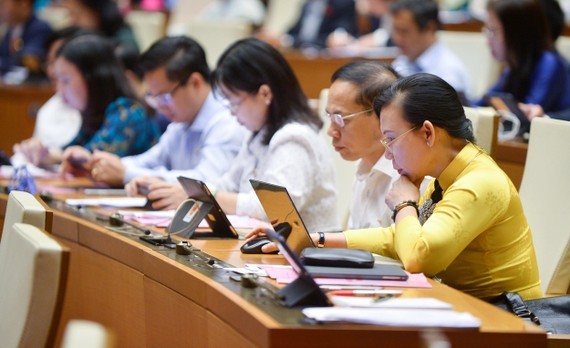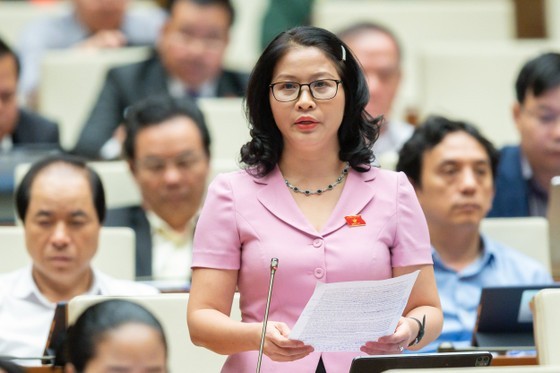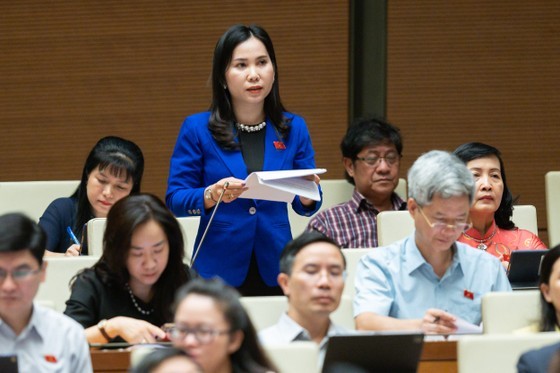 At the National Assembly (NA)’s fourth session on the socio-economic situation
At the National Assembly (NA)’s fourth session on the socio-economic situation
At the National Assembly (NA)’s fourth session on the socio-economic situation today, deputy Le Thi Ngoc Linh from the Mekong Delta Province of Bac Lieu suggested that sanctions should be stronger than violations of social networks. Notably, in her speech, she said networks have had a great influence on the thought and behavior of all social classes, including young people who have been using social networks a lot.
According to statistics, the major social networks favored by young people in Vietnam are platforms such as Youtube with a rate of 92 percent, Facebook with a usage rate of 91.7 percent, followed by Zalo 76.5 percent.
According to preliminary statistics of more than 30 million internet users in Vietnam, about 87.5 percent are using social networks in the age group of 15-34 accounting for 71 percent. Young people averagely spend 5 hours a day on social networks which has a great impact on their health condition and learning. Besides, more and more people while surfing on the internet have violated the present regulation by posting false information, badly affecting the Party, State, organizations and individuals.
 Deputy Nguyen Thi Lan from Hanoi
Deputy Nguyen Thi Lan from Hanoi
 Deputy Le Thi Ngoc Linh from the Mekong Delta Province of Bac Lieu
Deputy Le Thi Ngoc Linh from the Mekong Delta Province of Bac Lieu
Typically, the Facebook account of Nguyen Phuong Hang in HCMC and the account of Dang Nhu Quynh in Hanoi. Moreover, some individuals take advantage of social networks to cheat, appropriate property, and buy and sell counterfeit and banned goods. Some conflicts even stemmed from disputes on social networks leading to fights in real life, leaving many painful consequences.
After analyzing the negative sides of using social networks, she recommended continuing to improve mechanisms and policies for social networks, so that bad guys do not have the opportunity to commit illegal acts on the Internet.
At the session, deputy Nguyen Thi Lan from Hanoi, a member of the National Assembly's Committee on Science, Technology and Environment, Director of the Vietnam Academy of Agricultural Sciences is interested in developing the science-technology market – the key to the promotion of innovation and sustainable socio-economic development and the competitiveness of the economy in the context of the Fourth Industrial Revolution.
She proposed the Government and National Assembly review and perfect the legal framework to create favorable conditions for research institutions to create many high-quality scientific and technological products with commercialization potential.
According to her, the government should pilot a number of breakthrough mechanisms for science and technology organizations such as assigning tasks, ordering research according to funding packages for at least five years so that institutions can be proactive in their research strategies, creating scientific research products have the potential to promote the science and technology market.
Along with that, Ms. Lan said renewing the financial mechanism for payment, settlement and bidding in science and technology tasks is needed in addition to a mechanism for venture capital investment, encouraging pioneering scientists to research in new and difficult fields. Moreover, the government should set up business models, cooperative models, and many other innovative start-up models in universities.
Last but not least, the Government and the National Assembly also need to give priority to strong investment in the research and innovation sector - where science and technology products are provided.
Currently, the State budget for the science and technology of Vietnam is very low compared to other countries. For instance, in 2019, the government just spent only about 0.5 percent of its Gross domestic product (GDP) on scientific and technological research while Thailand spent 1.14 percent of its GDP, China 2.4 percent of its GDP, South Korea 4.8 percent of its GDP, Germany and the US spent an amount of money 6-7 times more than Vietnam. Thankfully, Korea became a model for developing an economy based on science and technology.
With that analysis, deputy Nguyen Thi Lan suggested that the Government review the planning of science and technology organizations, universities, and research institutes to have an investment strategy by increasing funding for research on science and technology as well as improve the quality of science and technology human resources for research institutes and universities.
























